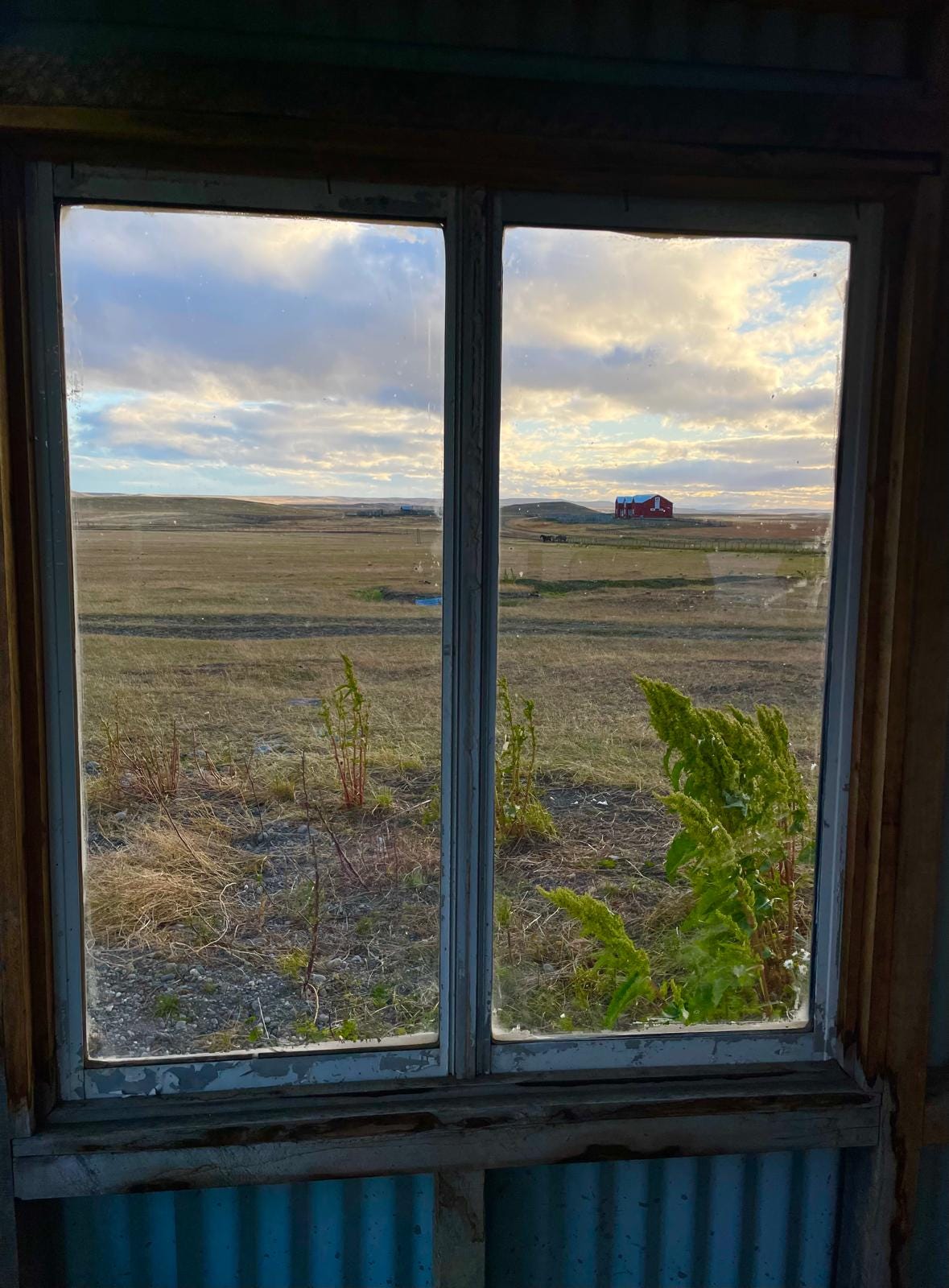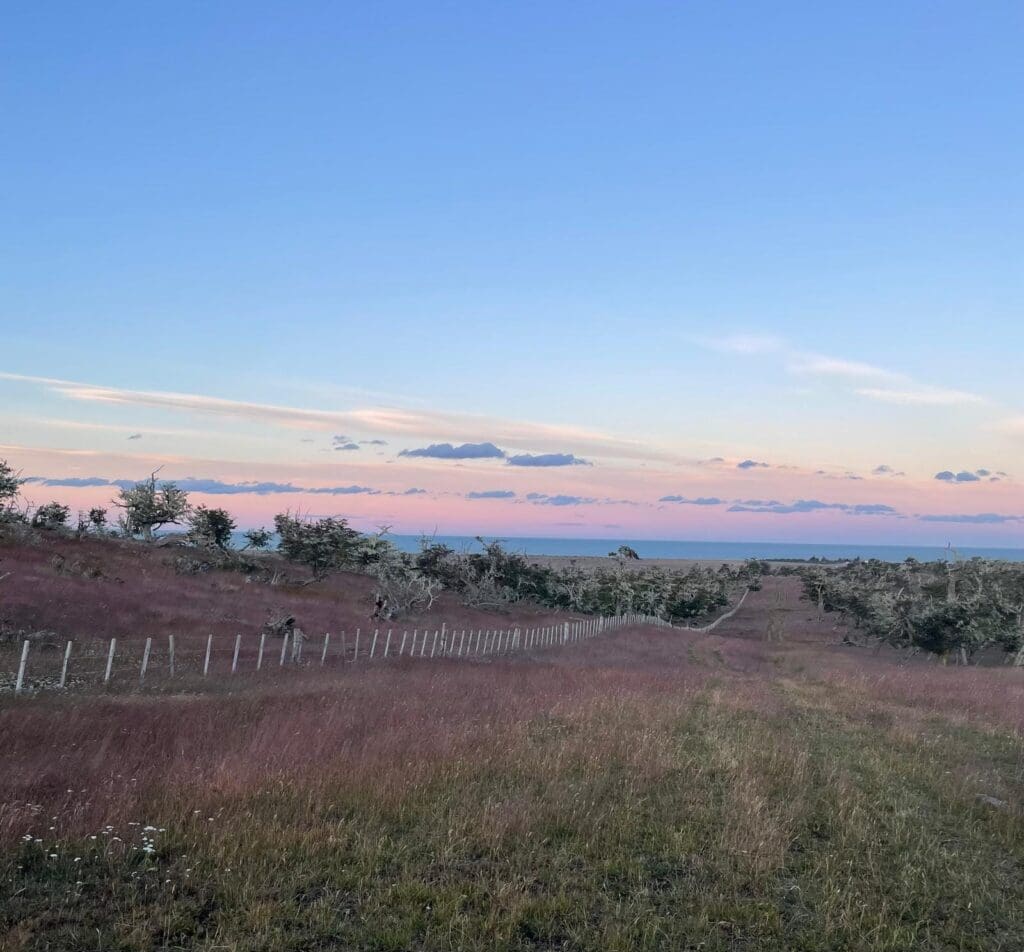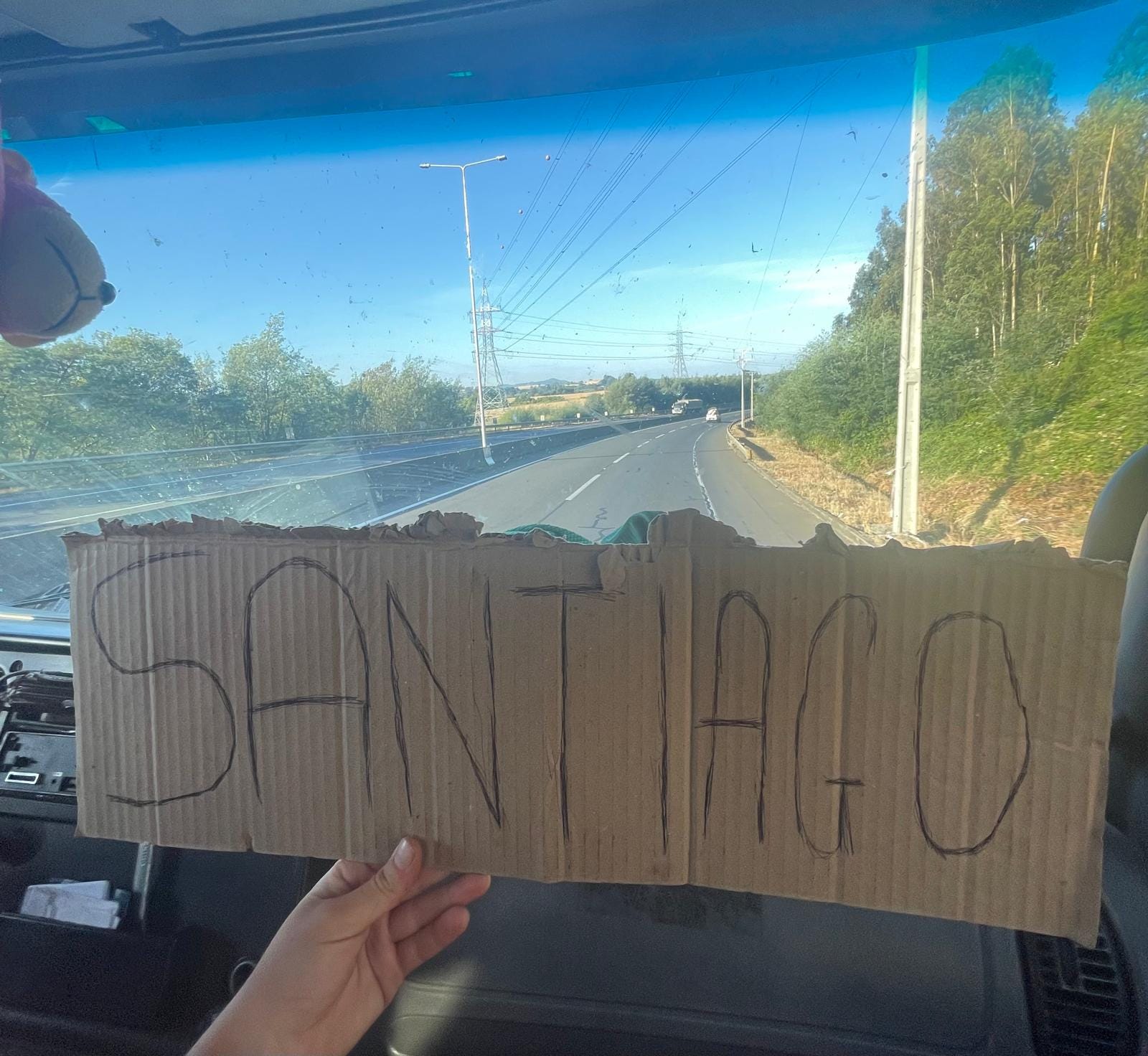29 January 2025 – The sunset jolts up and down the glass of the jeep that runs downhill on the fine, yellow grass that seems to characterise Tierra del Fuego. Some Argentine folk music and Pili dances with a mate in hand are on the radio. We are returning from a house with wheels parked in the middle of the Estancia, a few kilometres from the big house once used by the herdsmen when moving the cows. We had brought a chocolate cake with dulce de leche and banana, a few apples, some cheese sandwiches and a couple of cameras, one of them analogue, to capture a pinch of this light in the middle of the fields and take it far away.
As we head home, towards my last night here, I think it is a strange coincidence that I have found myself on an evening like this, with ten other people wearing the boina, the typical hat of the gauchos, children of the owners of these lands or young people from Buenos Aires who come to work for the summer. I’ve been here for a week, but I’ve got into a routine that could last much longer; everyone likes my pasta omelettes, and I’m getting used to waking up early, picking vegetables or washing and packing them, or doing the jobs that are needed on this farm/yard that moves like an anthill.
At dinner, I talked to Ines, telling her that I was leaving for the north the next day and that I had to reach Santiago as quickly as possible to meet up with Luisa, who was arriving from Italy. She looked up momentarily as if she had an idea and then told me: ‘But my parents are leaving these days and are going north by car, surely they can take you!’ Before I realised that they would give me a lift for more than half the way, i.e. 2000 kilometres, tears came to my eyes: it seems that the world moves and rearranges itself like the pieces of a jigsaw puzzle to solve the problems in front of me. It happens all the time, I don’t understand how it is possible. When I open my mouth, even without asking, a solution arrives: a house to stay in and a car to get into.

Two days go by, and I am squeezed into the backseat in the couple’s car, along with their two sons, one of whom works online and has a paraphernalia of cables and batteries to run the internet in the middle of the pampas we traverse for 24 hours. It is an immersion in family life of bickering and affectionate banter, and my knees pull and tug from the constant bending over. The hours on the navigator become fewer and fewer, and at some point, we reach the point where we have to part: I pick up my rucksack and my way, and they finally stand a little wider. It is sunset, and I wonder what fate will have for me now: my fondest hope is to advance 5 kilometres to the next village and sleep a long night with my legs stretched out after endless hours of driving.
The second car that passes smiles and pulls up: it is Lorena, a schoolteacher and fisherman from Argentina who enjoys her summer holidays travelling around her gigantic country. We immediately commune, another hour or so on the road and stop to sleep on the riverside at the edge of a rather lively town. We share a giant hamburger and fries and settle down for the night: she has her bed mounted in the car, and I pitch my tent practically in a flowerbed, but I am so tired that I don’t even notice the noise of the trucks passing on the road ten metres away.
Waking up at 7, Lorena makes me coffee, and I fall asleep in the passenger seat for another couple of hours. Then she drops me off in Bariloche, where another couple of passes and a three-hour wait at the border will take me to the coveted Chile. At this point, it is 4.30 in the afternoon. I take a piece of cardboard and write ‘Santiago’ on it, but there are still almost 1,000 kilometres. I am in the acceleration lane of the Pan-American highway and see a truck pull up 200 metres ahead. I approach it and ask if it has stopped for me. ’No, I had to check a wheel, but I’m there now; where do you want to go?’ And down another five hours to the north. At 10 pm, he dropped me off at a service station that he said was safe to spend the night: 24-hour cameras, a guard, and all the amenities.
I am just asking the lady at the fast food restaurant for some information, explaining to her that I want to stay close to the highway because I am in a hurry to get to Santiago the following day when a pot-bellied trucker in flip-flops who is eating a sandwich next door tells me that he is going right there. ‘Leaving in the morning?’ No, just now. What was I saying earlier about problems formulated out loud and their solutions?
I think about it once, maybe twice, and then I tell him I’m in, with peace of mind for my knees. His name is Luis; he says he likes driving at night and offers me his phone’s internet connection and breakfast. He shows me photos of his children; two are carabinieri, and one is studying; his wife is dead, so this job that takes him away from home for long weeks is perfect for him. Occasionally, while driving, he watches videos on TikTok, but when I make to buckle up, he says he is a professional driver, so I don’t worry too much. I pretty much sleep through the night, and in the morning, he drops me off at the bus terminal just outside the city. He keeps my ‘Santiago’ sign as a souvenir since I no longer need it.
Long-time readers will remember that in episode zero of this newsletter, I wrote that the world is a whole of people you can trust. Indeed, the opposite is also true, and two questions I asked myself when I got out of the truck to go to the bathroom, leaving everything I had on board, or when three months ago in Santo Domingo I asked the saleswoman at a Puma shop if she could watch my backpack for a couple of hours while I walked around downtown. But each time I tell myself that this trip is based entirely on trust in others, and that if I had listened to everyone who told me it was dangerous, that I would be robbed and that I shouldn’t trust them, I might not have left the first airport yet.



